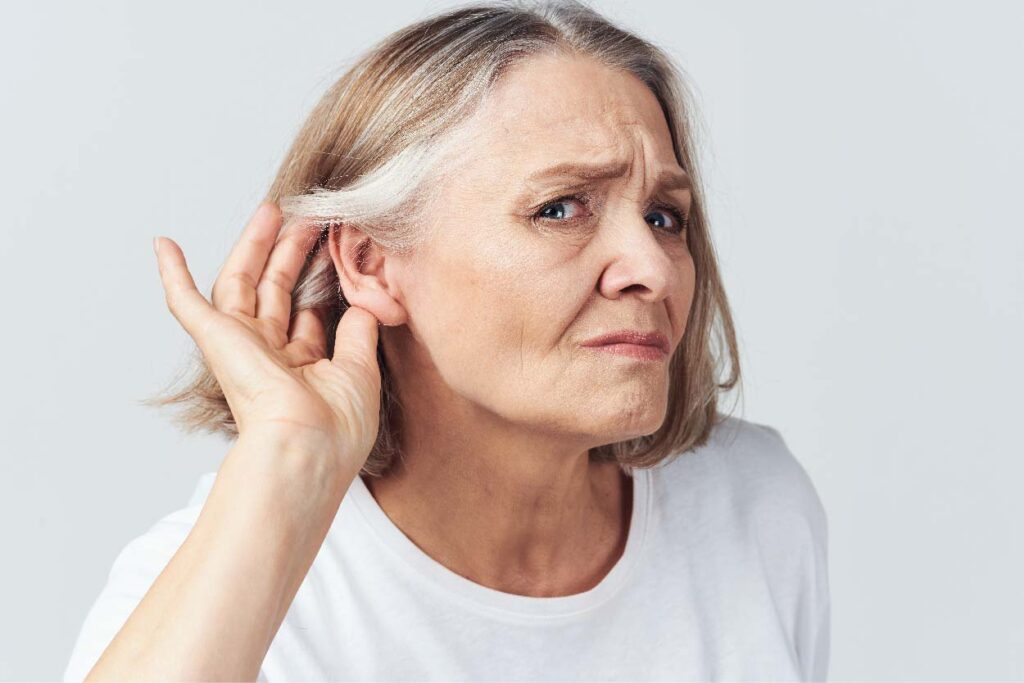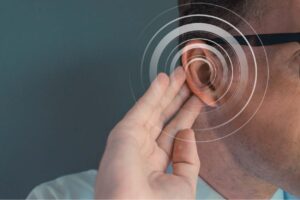10 Common Causes of Hearing Loss

For many people, hearing loss occurs gradually with age. Not only is age a factor in the development of hearing loss, but other health conditions and environmental exposure can contribute. People of all ages need to understand the risk factors for hearing loss, so they can take a proactive approach to prevent damage to their ears.
Keep in mind that medicine can’t reverse most types of hearing loss. Avoiding these common causes of hearing loss is essential if you want to maintain good hearing that lasts for years.
Common Causes of Hearing Loss
Many factors can cause temporary or permanent hearing loss. Some of the most common culprits include:
- Aging: The older you get, the higher risk you are of experiencing hearing loss. An estimated 33% of people between the ages of 65 to 75 in the United States have some degree of hearing loss. After the age of 75, the estimated number is to be 50% of the population.
- Loud Noises: Not only is it uncomfortable to listen to loud music or heavy machinery, but these noises could damage the sensitive inner areas of the ears. The cochlea has nerve cells, known as hairs, that send electronic signals to the brain. Loud noises can cause these hairs to be damaged, disrupting the transmission of noise signals from the ear to the brain. Examples of loud noises that can cause hearing loss include recreational vehicles, construction equipment, firearms, jet engines, loud music (via speakers or headphones), power tools, etc.
- Ruptured Eardrum: The eardrum is an integral part of your hearing, and it can result in issues if the eardrum is damaged. Common causes of a ruptured eardrum include sudden changes in pressure, poking the eardrum with something inserted in the ear, or loud bursts of noise.
- Medication: If you read the fine print for certain prescriptions, then you will see that hearing loss is a potential side effect of using the drug. Some medicines can damage the ears, depending on the dosage and length of time you use the medication. Prescriptions for chemotherapy, antibiotics, Viagra, and diuretics for heart disease are known causes of hearing loss. Before taking any prescribed medication, it’s smart to talk to your doctor about potential side effects.
- Allergies: An allergic reaction, such as hay fever, can affect fluid buildup in the ears. Often, allergies cause temporary hearing loss because of a blocked ear canal. But it’s possible for an infection to develop, which can lead to permanent hearing loss in the future. Managing allergies can be an essential step in protecting the ears.
- Illness: Most people know that untreated ear infections can damage hearing. But other types of illnesses can also cause hearing loss, especially when the upper spinal cord is affected. Examples include meningitis and measles. Children are particularly susceptible and could experience permanent hearing loss in childhood.
- Smoking: Did you know that smokers have a higher risk of developing noise-induced hearing loss? When a person smokes, it causes irritation in the middle ear lining. Additionally, the nicotine can block neurotransmitters that communicate auditory information to the brain.
- Earwax: Over time, a gradual buildup of earwax can prevent sound waves from conducting as needed. For example, earwax can block the ear canal. Luckily, this type of hearing loss is often reversible. You can schedule an appointment for a doctor to carefully remove the wax without damaging the inner areas of your ears.
- Tumors: If a tumor or bone growth occurs in the middle or outer ear, it could interfere with hearing. One type of tumor is acoustic neuroma, a benign, slow-growing tumor that can occur on the nerve connecting the brain and inner ear.
- Heredity: Some people have a genetic makeup that makes them more susceptible to inner ear damage over time. Between 35 – 55% of age-related hearing loss is genetic, according to estimations. Gene mutations can affect both conductive hearing loss and sensorineural hearing loss. Examples of genetic conditions that can cause hearing loss include Usher’s syndrome, Otosclerosis, and Pendred syndrome.
Just because you may fit the description to the common causes of hearing loss in this list doesn’t necessarily mean that you will immediately lose your hearing. Often, it is a process that happens over months and years, gradually causing a loss of hearing over time.
Preventing Hearing Loss
Don’t wait until you are losing your hearing before you take a proactive approach to protect your ears. A few simple steps can go a long way to maintain full hearing and minimize the risk of premature hearing loss.
For example, always protect your ears to limit the intensity and duration of noise exposure. If your workplace is loud, then use hearing protection such as earplugs or soundproof earmuffs. Employers often provide this equipment to employees as-needed.
Consider how your hearing can be damaged by recreational risks over time. It’s essential to use ear protection if you regularly participate in activities that could affect your hearing, such as:
- Attending rock concerts
- Snowmobiling
- Hunting
- Listening to loud music with headphones
- Using power tools
Turn down the volume, so you aren’t blasting your ears all the time. Not only do you need to decrease the volume, but it’s also important to take breaks from the noise occasionally.
Also, don’t underestimate the importance of regular hearing testing. If you work in a noisy environment or you feel like your hearing is starting to decrease, then you should schedule a hearing test as soon as possible. Working with an experienced provider can help you identify the cause in the earliest stages. Then, you can take the necessary steps to protect your remaining hearing and prevent future loss.
Is it Time to Test Your Hearing?
Our skilled team at Fairfax Hearing Center is here to assist when you need a hearing test. We offer full-service solutions in our office to identify potential risk factors, protect your hearing, and maximize available hearing whenever possible. For more information, contact us at Fairfax Hearing Center to book an appointment with a hearing specialist.

